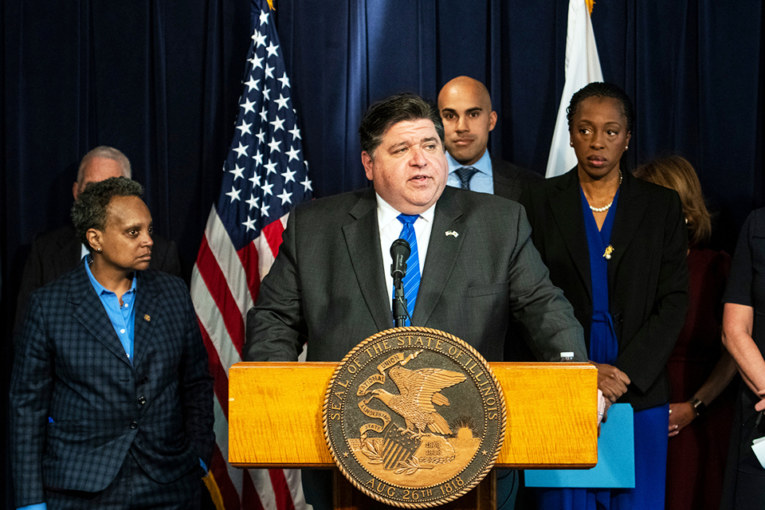
CHICAGO – Governor JB Pritzker and Chicago Mayor Lori E. Lightfoot joined City and State public health officials to announce a robust and coordinated effort to prevent spread of the 2019 novel coronavirus (COVID-19).
Earlier this month, Illinois became the first state to provide COVID-19 testing in-state, allowing IDPH to produce results within 24 hours. Next week, the administration will expand testing statewide, with new testing labs in the central and southern regions to join the existing testing lab in Cook County. Following the recommendation of the CDC, the state will also partner with hospitals in every region to engage in voluntary testing, which will allow us to diagnose new cases quickly and prevent any further community spread. Under the plan, certain emergency departments will soon begin testing select patients who present with influenza-like symptoms for COVID-19.
“Our top priority is keeping Illinoisans safe and we are using every tool and resource at our disposal to prepare for this virus and contain any spread,” said Governor JB Pritzker. “This is a coordinated effort with state, city and local entities working together to put the full weight of our government behind this response. Illinois has a leading public health system that was the first – and remains one of just a few nationally – able to test for COVID-19 and we will continue leading the way forward to protect our communities.”
To date, Illinois has had two confirmed cases of COVID-19 and both individuals have made a full recovery. The immediate health risk to the state remains low. While the latest available information suggests that person-to-person spread will continue to occur and additional cases are likely to be identified in the United States, most cases of COVID-19 cause a mild illness. In very rare cases people infected with the virus have died. Additionally, to date, data shows that children are less likely to become ill.
“For over a month, Chicago has been working daily to strengthen and refine our response to this situation, contain the virus, and protect our residents from any harm,” said Mayor Lightfoot. “While the chances of contracting coronavirus remain extremely low, we will continue to closely monitor this situation as it evolves, and take appropriate preventive and pre-cautionary measures as needed in coordination with public health agencies, and our many community and healthcare partners.”
“We continue to actively monitor the international and domestic situation closely, plan ahead and strengthen and refine our local public health response,” said Dr. Ezike, Director of IDPH. “We’ve undertaken these serious, but necessary measures while remaining in close communication with our federal and local partners to ensure all systems in place work efficiently and effectively.”
“Cook County Department of Public Health continues to work closely with IDPH, CDPH and the CDC in our efforts and will use what resources we have to minimize the risk of spread in our communities,” said Dr. Terry Mason, COO of Cook County Department of Public Health. “The collaboration between all the agencies is what resulted in the best possible outcome for the two confirmed cases. This is classic public health at work doing what we are trained and prepared to do.”
The city and state are experienced at responding to infections disease outbreaks and continue to work in lock step to put systems in place to respond to this new virus. Current efforts include:
- Airport screening and monitoring health of travelers returning from China.
- Investigating confirmed cases of COVID-19 and monitoring friends and family who may have been exposed.
- Planning community measures that can help limit the spread of disease, like having ill individuals stay home (including housing and transportation needs).
- Providing regular guidance to hospitals and healthcare professionals, including information on infection control, personal protective equipment (PPE) supply planning, and clinical evaluation.
- Working to expand local laboratory testing for COVID-19.
- Developing and distributing guidance for childcare facilities, schools, universities, businesses, community- and faith-based organizations, among many others.
In addition to efforts by local health systems, there are important steps individuals and communities can take to help minimize the risk of COVID-19 spread:
- Practice everyday preventive actions such as performing frequent hand hygiene, using hand sanitizer or soap and water when visibly soiled; covering your cough and sneezes; avoiding ill people; and staying home when sick (except to seek medical care). These simple actions can prevent the spread of many illnesses, including COVID-19.
- Healthcare providers should continue to ask patients with fever and respiratory symptoms about their travel history. Refer to CDC’s Guidance for Healthcare Professionals for more information on screening and evaluating Persons Under Investigation.
- Childcare facilities, K-12 schools and colleges/universities should review their emergency operations plans, including strategies for social distancing and online learning.
- Businesses and employers should actively encourage all employees to stay home when sick, perform hand hygiene, and cover coughs and sneezes. Businesses should review their emergency operations plan, including identification of essential business functions, teleworking and flexible sick leave policies. For more information see CDC’s Interim Guidance for Businesses and Employers.
- Community- and faith-based organizations should review existing emergency operations plans, including strategies for social distancing and modifying large gatherings such as concerts and festivals.
Officials also warned against stigmatization toward specific populations and said knowing the facts about COVID-19 will help minimize stigma and misinformation.
This is a rapidly evolving situation and information will be updated as it becomes available. More information can be found on the IDPH website, the CDPH website, and the CDC website and questions can be directed to the IDPH hotline, 1-800-889-3931.



